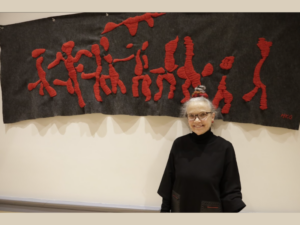Photo by Ariel DiOrio
Defund SPD outlined the City’s past attempts, in the hopes of informing budget decisions.
(Somerville Wire) – The Defund SPD Research Team gave a presentation, led by Sam Alterman, on a brief history of the attempted reforms to the Somerville Police Department, during a City Council Finance Committee meeting held on May 25. The Research Team endeavors to create “data-supported narratives to inform and convince a majority of Somerville residents, all City Council members, and the Mayor that reallocating a significant portion of the SPD budget to high priority areas will have an overwhelmingly positive effect on the health, safety, and well-being of all Somerville residents.” However, Alterman stressed that during this discussion, their personal opinion did not matter, and that they were simply presenting a catalog of efforts.
“What I’m not here to do tonight is to present Defund’s plan for public safety staffing,” said Alterman. “Instead, my goal for tonight is to share with this council the City’s own previous analyses of public safety staffing, in the hopes that this can inform you as you make budgetary decisions over the next month.”
Alterman began by introducing the 2001 Management Study conducted by MMA Consulting Group, released in January 2001. The study made 82 recommendations, including that roles filled by sworn officers should be reassigned to trained, unarmed civilians. It also said that the SPD should make more effective use of its resources and that better management could increase efficiency. Alterman pointed out that these topics are old but have also been discussed by the City Council over the past year.
In 2004, Mayor Joe Curtatone took office and hired former MA Attorney General Scott Harshbarger to evaluate progress made on the 2001 study. Harshbarger found that not much had changed and that “little real progress [had] been made.” Some called this analysis an important call to action, while others, like then Chief of Police George McLean, said that the resources of the department had already been stretched thin. Harshbarger suggested creating a 2005 Police Advisory Group, which he ended up chairing. This group made similar recommendations to the 2001 suggestions, once again arguing, among other points, that increasing staffing was not necessary. In 2008, Curtatone would state that he thought issues of police reform had been settled and even moved to hire 12 new officers.
The community remained invested in changes to the SPD, as demonstrated in the response to the 2019 Boston “Straight Pride Parade.” After officers used force against counterprotesters, the SPD conducted a self-review of its actions and found no fault. Curtatone said there would be an ongoing dialog, and in January 2020, the City held a community feedback meeting. Beyond this forum, there has been no further follow-up directly related to the events, said Alterman. After the death of George Floyd, residents called for the defunding of the SPD, the shrinking of its budget, and the reallocation of funds to nonviolent public services. The City Council reduced the SPD budget by over $700,000, and the money was redistributed.
“The City’s implementation has once again raised concerns about slow walking reforms,” said Alterman. “The original timeline presented by the Mayor targeted hiring a Racial and Social Justice Director by September 2020. That job posting did not go up until November 2020, and Denise Molina Capers wasn’t hired until March 2021. The community process of reimagining policing, slated to begin in October 2020, has still not begun, making it impossible for a final report to be released this month, in time for reallocation of funding to implement the new public safety model, being a part of the FY22 budget, as originally proposed. If the public seems impatient for these changes, it may be because the City is not living up to the expectation it has set.” While there have been repeated calls throughout history for reform, said Alterman, there has been only partial or no progress.
Councilor Mary Jo Rossetti expressed concern about the name “Defund SPD,” stating that the title makes many community members anxious.
“I think there’s a lot of angst in the community when they hear ‘Defund the Police,’ the word ‘defund,’ which in some definitions could mean to just abolish,” said Rossetti. “There are a lot of constituents who I converse with who want to know, what would we do if we didn’t have a police department? I wish there could be another terminology so that more people could work together on addressing this situation that we have been discussing for a couple of years now. … I think the term ‘defund’ puts a lot of people’s backs up straight and anger in people who don’t understand that there are groups of pods of people that want to work together and readdress what should the police department be handling and what other areas of different communities could monies be put into, to take away from what the police department’s responsibilities are and to take it on in other ways instead.”
Rossetti added that if this budget season, the City Council continues to reduce more funding from the police department, there is no guarantee that the Mayor will redistribute money towards other services. “We don’t have that guarantee because by law, as a City Council, we don’t have the power to take from one line and to put it into another.”
Chief of Police Charles Femino was not able to make it to the meeting, but provided a statement reflecting on the presentation. He wrote that he wishes the talk could have accounted for some recommended reforms that SPD did end up putting into practice, since 2001.
“We appreciate the community’s interest in the history and evolution of the Somerville Police Department, particularly as we move forward with engaging the community in reimagining policing,” wrote Femino. “Twenty years have passed since the 2001 Management Study, and the Police Department has not just undergone significant reforms since that time, we have been lauded for leading the way for others. It is unfortunate that the presentation did not include the vast majority of recommended reforms from 2001 that SPD implemented as well as the advances that have gone well beyond it. We are working to provide clarification on some of the points discussed during the Finance Committee meeting that lacked the context needed for a more complete and accurate understanding of these reforms and of the department.”
In addition, a spokesperson from the City pointed out some examples of changes the SPD has undergone.
“The presenter alluded to the failure of the department to civilianize all nine positions recommended in the 2001 report,” wrote the spokesperson. “However, seven of the nine recommended positions were formally civilianized, while one is no longer occupied by a police officer, and the final position was reconfigured to a new needed investigative function that needs to remain within the force. The presentation presented decreased overtime costs during the pandemic as a new normal but failed to recognize the cause was temporary pandemic impacts such as a halt to in-person trainings, the closure of the courts, and cancellations of community events that SPD provides safety for such as detour and roadblock management.”
At the close of the meeting, Councilor J.T. Scott said that the item would be kept in committee for further discussion, given that members of the SPD were not there to respond. At a future Finance Committee meeting, said Scott, he would like to hear more perspectives.
All Somerville Wire articles may be republished by community news outlets free of charge with permission and by larger commercial news outlets for a fee. Republication requests and all other inquiries should be directed to somervillewire@binjonline.org.
SUBSCRIBE TO THE FREE SOMERVILLE WIRE EMAIL NEWSLETTER: https://eepurl.com/hpBYPv
Shira Laucharoen is assistant director of the Boston Institute for Nonprofit Journalism and assistant editor and staff reporter of the Somerville Wire.







